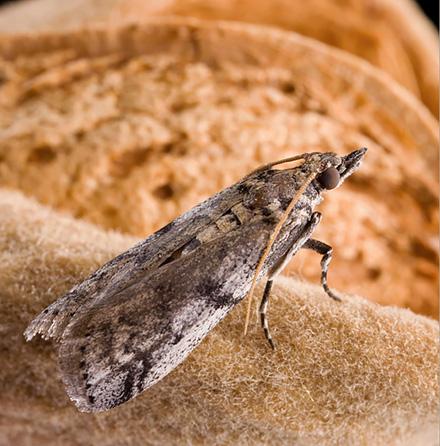Food Additives Reduce Cancer Risk
We don’t normally think of insects as a cause of cancer, but, in a roundabout way, some are. That’s because certain types of mold (fungi) produce small cancer-causing chemicals known as mycotoxins, and insect pests make the problem worse by carrying the fungi from plant to plant.
Mikhail Shilman, research chemist at the Agricultural Research Service’s (ARS) Foodborne Toxin Detection and Prevention (FTDP) research unit in Albany, CA, is leading a project to discover new chemicals for use in agriculture to inhibit these insects.
“We established a collection of 600 natural substances previously approved by the Food and Drug Administration (FDA) and Environmental Protection Agency (EPA) for human use,” he said. “All our chemicals have been used by humans for more than 20 years, with a lot of human and animal safety information available. We aim to ‘repurpose’ these molecules for new insecticidal uses.”
Shilman and his team focus on natural chemicals because using synthetic compounds (those not found in nature) have limitations, including side effects in humans and environmental contamination.
“Evolution has created natural chemicals that serve biological functions, such as inhibiting pests,” he said. “Moreover, many natural chemicals often disappear from the environment faster than synthetic compounds, thus reducing potential environmental impact.”
Fruit flies (Drosophila melanogaster) and navel orangeworm (Amyelois transitella) moths are the primary test subjects in the study.
“We test each chemical for its ability to affect insect immunity and for its toxicity,” he said. “So far,” we have evaluated 200 chemicals that are approved (for humans) as food additives and taste enhancers. We have identified several compounds that kill flies and moths in seconds. Moreover, the same chemicals destroyed other agricultural insect pests as well.”
In addition to being natural and approved by the FDA, Shilman said the newly-discovered insecticidal chemicals have several features that make their potential use in the field desirable: they evaporate quickly without polluting the soil and environment; as food additives, they are already being produced on an industrial scale at low cost; and some of the same chemicals also suppress the growth of mycotoxin-producing fungi – meaning they may target both the mold and the insect.
ARS established a non-funded cooperative agreement with entomologists at the Agricultural Research Organization of The State of Israel Ministry of Agriculture and Rural Development to work on the project.
“The implications of our research go beyond California's agriculture,” Shilman said. “California shares similar geography, agriculture, and insect pests with Israel. Thus, developing new approaches for suppressing insect pests is urgently needed in both countries. In the future, we plan to repurpose more natural chemicals against pathogenic agents in agriculture across the globe.” Scott Elliott, ARS Office of Communications
Editor’s note: Mikhail Shilman contributed to this story.
You May Also Like:


